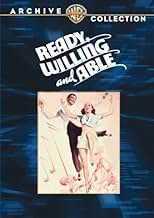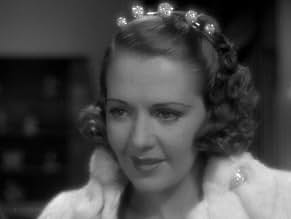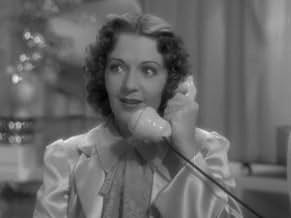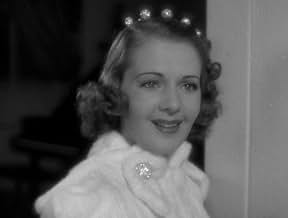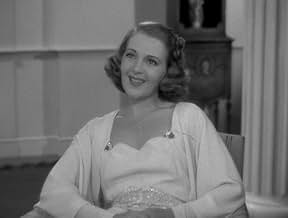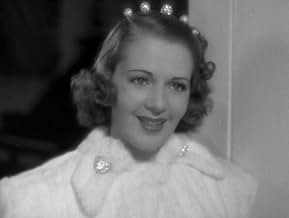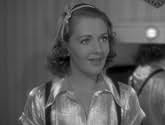Two songwriters want to cast a British star in their new show.Two songwriters want to cast a British star in their new show.Two songwriters want to cast a British star in their new show.
- Nominated for 1 Oscar
- 1 nomination total
Al Shaw
- Moving Man
- (as Shaw)
Sam Lee
- Moving Man
- (as Lee)
Lillian Kemble-Cooper
- Mrs. Buffington (Credits)
- (as Lillian Kemble Cooper)
- …
Featured reviews
Ross Alexander was one of those unfortunates of life. He was good at the acting business and was given roles that would normally had gone to Dick Powell if he wasn't so busy. The trouble was that he was gay, and because of that in the 1930's, he took to the drink. He made "Ready and Willing" with Ruby Keeler in 1937 and then shot himself. His last picture doesn't stand out all that much as the story of "putting on a show" seemed to be a continuing serial throughout the '30's - but, he is quite good in it and delivers the main song "Too Marvelous for Words" first as a recitation and then in song - a couple of times - and his warbling is quite pleasing. Even though he was the leading man in this picture you can tell what the Warner Bros thought of him as his name is fifth on the list.
Ruby Keeler comes in as the love interest although that isn't clear at the start. She doesn't get to do all that much in the way of dancing about as in this picture as she is there for her acting ability. The plot maneuvers itself all over the place - there is mistaken identity, the putting on of a show, ineffectual fiancés, old ham actresses, actresses coming over from England, movie moguls, lyricists continually writing songs, Italians getting bamboozled and threatening landladies. Still, all this allows us to enjoy a few assorted character actors. Why there is even a short outing for two vaudevillians - Shaw and Lee in amongst E. E. Clive as a dimwitted Knight of the Realm, Barnett Parker as the quintessential English waiter, May Boley as the requisite fat landlady, the Romanian Adrian Rosley imitating Henry Armetta's typical Italian, Louise Fazenda as a ham actress who gets her Shakespeare all mixed up and Hugh O'Connell as whatever it is he is supposed to be. Without these characters doing their stuff the picture would have fallen quite flat.
As Ruby Keeler wasn't asked to sing, we are entreated to Wini Shaw coming in and doing that for her by way of a twist in the plot. She doesn't have all that much to do but her singing voice is a welcome addition. Also in lead roles we have Allen Jenkins as a theatrical agent, lowering the tone as per usual, Carol Hughes as Ruby Keeler's friend and Lee Dixon as Ross Alexander's theatrical partner. Also showing up briefly is Jane Wyman.
They don't make pictures like this anymore because everybody has now become too sophisticated and serious. Such a pity because it is pictures like these which are total frothy nonsense that I find highly entertaining and marvelous for taking one's mind away from the awful goings on in the world. It's fun and it's quite obvious from the finished product that everyone was having a rollicking good time making it.
Ruby Keeler comes in as the love interest although that isn't clear at the start. She doesn't get to do all that much in the way of dancing about as in this picture as she is there for her acting ability. The plot maneuvers itself all over the place - there is mistaken identity, the putting on of a show, ineffectual fiancés, old ham actresses, actresses coming over from England, movie moguls, lyricists continually writing songs, Italians getting bamboozled and threatening landladies. Still, all this allows us to enjoy a few assorted character actors. Why there is even a short outing for two vaudevillians - Shaw and Lee in amongst E. E. Clive as a dimwitted Knight of the Realm, Barnett Parker as the quintessential English waiter, May Boley as the requisite fat landlady, the Romanian Adrian Rosley imitating Henry Armetta's typical Italian, Louise Fazenda as a ham actress who gets her Shakespeare all mixed up and Hugh O'Connell as whatever it is he is supposed to be. Without these characters doing their stuff the picture would have fallen quite flat.
As Ruby Keeler wasn't asked to sing, we are entreated to Wini Shaw coming in and doing that for her by way of a twist in the plot. She doesn't have all that much to do but her singing voice is a welcome addition. Also in lead roles we have Allen Jenkins as a theatrical agent, lowering the tone as per usual, Carol Hughes as Ruby Keeler's friend and Lee Dixon as Ross Alexander's theatrical partner. Also showing up briefly is Jane Wyman.
They don't make pictures like this anymore because everybody has now become too sophisticated and serious. Such a pity because it is pictures like these which are total frothy nonsense that I find highly entertaining and marvelous for taking one's mind away from the awful goings on in the world. It's fun and it's quite obvious from the finished product that everyone was having a rollicking good time making it.
Lee Dixon and Ross Alexander, struggling songwriters, are dancing in their boxers because the tailor has their pants. The tailor wants fifty cents for his work, but they haven't four bits between them and so must resort to musical distractions. "Every time I come up here," the tailor complains, "you sing me out of your pants."
Meanwhile, shipboard, Ruby Keeler and a bunch of other "college girls" put on a show for their fellow ocean liner passengers. They're amateurs—but this is a Warner Bros. musical, so the show is big and polished. Ruby does a great song and dance; she would love to be a real Broadway star, but she knows that could never happen .
Music and high spirits abound in this lively musical about getting one's big break. Keeler, of course, gets her shot at the big time, as do Dixon and Alexander. And of course there is a major complication.
Allen Jenkins is at his best as a failed stage actor who, having tried everything else, becomes an "agent" and thinks he sees his big chance when he overhears a telegram being phoned in, sending to England for a big star.
Louise Fazenda is very funny as Ruby's teacher or chaperone, who admits that she herself once had aspirations as an actress—and then spends most of the movie reciting jumbled bits of Shakespeare. She holds her purse like a skull: "Alas, poor Yorick," she intones, "I knew him intimately." (At which Allen Jenkins gives her a funny look: "What's your friend doing now?")
Ross Alexander, as the songwriter, has the privilege of speaking and then singing the film's great song, "Too Marvelous for Words." Keeler's most memorable dance is the finale, in which she and Dixon dance from key to key on a giant typewriter.
Somewhat oddly, Keeler doesn't really sing and Alexander doesn't dance, and so the leading couple don't do any true duets—Alexander sings to Ruby instead of with her, and Dixon fills in as dancing partner.
Overall, it's no classic but still very entertaining—especially for fans of Ruby Keeler's wonderful dancing.
Meanwhile, shipboard, Ruby Keeler and a bunch of other "college girls" put on a show for their fellow ocean liner passengers. They're amateurs—but this is a Warner Bros. musical, so the show is big and polished. Ruby does a great song and dance; she would love to be a real Broadway star, but she knows that could never happen .
Music and high spirits abound in this lively musical about getting one's big break. Keeler, of course, gets her shot at the big time, as do Dixon and Alexander. And of course there is a major complication.
Allen Jenkins is at his best as a failed stage actor who, having tried everything else, becomes an "agent" and thinks he sees his big chance when he overhears a telegram being phoned in, sending to England for a big star.
Louise Fazenda is very funny as Ruby's teacher or chaperone, who admits that she herself once had aspirations as an actress—and then spends most of the movie reciting jumbled bits of Shakespeare. She holds her purse like a skull: "Alas, poor Yorick," she intones, "I knew him intimately." (At which Allen Jenkins gives her a funny look: "What's your friend doing now?")
Ross Alexander, as the songwriter, has the privilege of speaking and then singing the film's great song, "Too Marvelous for Words." Keeler's most memorable dance is the finale, in which she and Dixon dance from key to key on a giant typewriter.
Somewhat oddly, Keeler doesn't really sing and Alexander doesn't dance, and so the leading couple don't do any true duets—Alexander sings to Ruby instead of with her, and Dixon fills in as dancing partner.
Overall, it's no classic but still very entertaining—especially for fans of Ruby Keeler's wonderful dancing.
Lee Dixon and Ross Alexander are minor actors in the history of Hollywood and here they both star as two struggling guys trying to peddle their musical show. But when you read their back story on IMDb, they are a very sad couple of guys. Before this film even debuted, Alexander (Barry) was dead from a self-inflicted gunshot wound (he was 29)! And, less than a decade later, Dixon (Pinky) would be dead...a guy who drank himself to death at age 42! Talk about tragic! Fortunately, their co-star, Ruby Keeler, had a much happier life!
When the film begins, Pinky and Barry are both struggling to market their new show. Fortunately, they just found a backer--and in order to get this backing they need to sign a British actress. When they go to meet her, the duo make a mistake and accidentally hire an unknown chorus girl (Ruby Keeler) with the same name. She's excited about the opportunity and so she keeps quiet and just accepts the offer. Unfortunately, when folks learn the truth, the show closes. What's next? See the film.
What follows at the end of the movie are a whole bunch of production numbers. Some are a bit dull, though the typewriter sequence is pretty amazing to watch. Overall, a passable bit of entertainment...but not much more. The songs aren't all that memorable and the plot is slight to say the least. The film could have used a bit more comedy to lighten the mood.
When the film begins, Pinky and Barry are both struggling to market their new show. Fortunately, they just found a backer--and in order to get this backing they need to sign a British actress. When they go to meet her, the duo make a mistake and accidentally hire an unknown chorus girl (Ruby Keeler) with the same name. She's excited about the opportunity and so she keeps quiet and just accepts the offer. Unfortunately, when folks learn the truth, the show closes. What's next? See the film.
What follows at the end of the movie are a whole bunch of production numbers. Some are a bit dull, though the typewriter sequence is pretty amazing to watch. Overall, a passable bit of entertainment...but not much more. The songs aren't all that memorable and the plot is slight to say the least. The film could have used a bit more comedy to lighten the mood.
As people have already noted, 'Ready, Willing and Able' is notable for being Ross Alexander's swansong before his tragic suicide and Ruby Keeler's last film for Warner Bros, but they certainly aren't the only notable factors of the film.
'Ready, Willing and Able' is not a great film, but it does have enough to make it watchable. Keeler is a very charming screen presence, and Alexander a likable leading man. Most of the supporting cast also fare well, with the hoots that are Allen Jenkins and Louisa Fazenda faring best. Wini Shaw is also very winning, as is Jane Wyman.
Of the song score, only one is really outstanding. That is the sublime "Too Marvellous for Words", though "Be Handy on Your Feet" is also catchy and "Just a Quiet Evening" very listenable. Don't remember much of the rest though. The classical music selections of Schumann, Chopin and Liszt are also a delight.
The film looks pretty good, apart from the odd tacky moment, it is very skilfully photographed and while not exactly expansive the set is generally a long way from cheap.
Conversely, to me Lee Dixon was wooden in acting and even more so in his dancing, which doesn't look natural or rhythmic at all. There is a lack of chemistry between Keeler and Dixon, though occasionally a sweet one with Alexander, just that one does miss Dick Powell (who one can't help thinking that he would have been a better choice). The story, even for a film musical, is overly simplistic, goes overboard with the silliness and dumbness and is as thin as thin ice.
Even flimsier is the hugely underwritten and dull script, that's far too lightweight. Of the choreography and dancing, the only one that stands out is the clever type-writing sequence. The others are pedestrian and under-cooked, am aware that one shouldn't expect Busby Bekeley to be involved in every film musical around this time but the songs generally did deserve better treatment than the indifference they were given here, this was a film that cried out for his involvement really.
All in all, watchable but not great. 5/10 Bethany Cox
'Ready, Willing and Able' is not a great film, but it does have enough to make it watchable. Keeler is a very charming screen presence, and Alexander a likable leading man. Most of the supporting cast also fare well, with the hoots that are Allen Jenkins and Louisa Fazenda faring best. Wini Shaw is also very winning, as is Jane Wyman.
Of the song score, only one is really outstanding. That is the sublime "Too Marvellous for Words", though "Be Handy on Your Feet" is also catchy and "Just a Quiet Evening" very listenable. Don't remember much of the rest though. The classical music selections of Schumann, Chopin and Liszt are also a delight.
The film looks pretty good, apart from the odd tacky moment, it is very skilfully photographed and while not exactly expansive the set is generally a long way from cheap.
Conversely, to me Lee Dixon was wooden in acting and even more so in his dancing, which doesn't look natural or rhythmic at all. There is a lack of chemistry between Keeler and Dixon, though occasionally a sweet one with Alexander, just that one does miss Dick Powell (who one can't help thinking that he would have been a better choice). The story, even for a film musical, is overly simplistic, goes overboard with the silliness and dumbness and is as thin as thin ice.
Even flimsier is the hugely underwritten and dull script, that's far too lightweight. Of the choreography and dancing, the only one that stands out is the clever type-writing sequence. The others are pedestrian and under-cooked, am aware that one shouldn't expect Busby Bekeley to be involved in every film musical around this time but the songs generally did deserve better treatment than the indifference they were given here, this was a film that cried out for his involvement really.
All in all, watchable but not great. 5/10 Bethany Cox
Ready Willing and Able (Warner Brothers, 1937). I finally had a chance to see this film and I have to admit, it's a cute little film from Warner Brothers in the late 30's. The actors seem like as though they are having a lot of fun and the musical numbers especially "Too Marvelous for Words" and "Just a Quiet Evening" are great. However, while watching this film, I feel a little sad for the late Ross Alexander who plays Barry Granville. Ross Alexander was very talented, nice looking, and had a great screen presence, but I guess Warners didn't know what to do with him. It seems as though his role was originally intended for Dick Powell, but he may have been unavailable. Keeler and Alexander have good screen chemistry and if he didn't die, maybe they would have made more films together.
Overall, a nice way to pass time. Definitely check out it.
Overall, a nice way to pass time. Definitely check out it.
Did you know
- TriviaFinal film of Ross Alexander. NOTE: He committed suicide two months before this film was released. Because of this event, Warners eliminated his name from the above title credits, substituted that of Lee Dixon--who actually had little more to do than to serve as Ruby Keeler's dancing partner in an otherwise subordinate role--and relegated Alexander's credit to that of a member of the supporting cast, even though he played the leading male role, and Keeler's romantic lead. Reportedly, James Newill dubbed Alexander's singing voice.
- GoofsWhen Ruby Keeler decides to ask Hugh O'Connell to pay the balance due on the show so it can open as scheduled, Hugh's jacket is closed in the wrong direction. Since his handkerchief is visibly on the correct side, it's not flipped film.
- Quotes
Pinky Blair: Hiya, baby! Hey, did you hear my last song?
Dot: I hope so!
Pinky Blair: Dot, what do you think I am now?
Dot: Well, a man who had been valet to a seal could be anything!
Pinky Blair: You guessed it. He's an actors' agent.
Dot: An agent? You have hit a new low!
- ConnectionsReferenced in The Honeymooners: The $99,000 Answer (1956)
- SoundtracksToo Marvelous for Words
(1937) (uncredited)
Music by Richard A. Whiting
Lyrics by Johnny Mercer
Played during the opening and end credits and as background music
Played on piano by Lee Dixon and spoken by Ross Alexander
Reprised on piano by Lee Dixon at a party
Sung by Ross Alexander at a party
Was the show's big production number at its opening, sung by Ross Alexander (dubbed by James Newill) and Wini Shaw and chorus,
and danced to by Ruby Keeler, Lee Dixon and chorus
Details
- Runtime1 hour 33 minutes
- Color
- Sound mix
- Aspect ratio
- 1.37 : 1
Contribute to this page
Suggest an edit or add missing content

